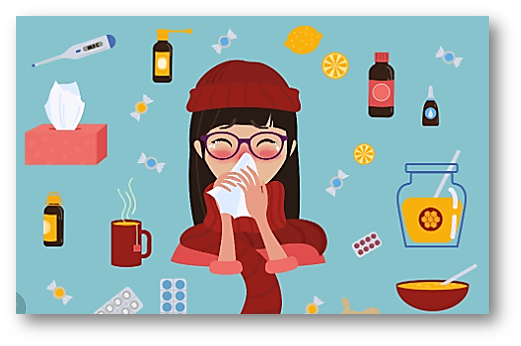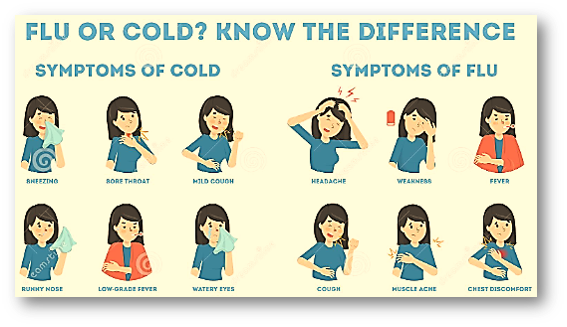
It is a common belief that cold weather can cause the flu, but this is not entirely accurate. While the flu is more common during the colder months of the year, this is not necessarily because of the cold weather itself. The flu is caused by a virus and spreads through respiratory droplets when an infected person talks, coughs, or sneezes. These droplets can be inhaled by someone nearby or land on surfaces where they can be picked up by others. It is possible that the flu is more common during the colder months because people tend to spend more time indoors, increasing the chances of coming into contact with the flu virus. The dry air that is often present during the colder months can also cause the respiratory system’s lining to become dry and irritated, making it easier for the flu virus to enter the body.
While cold weather may not directly cause the flu, it can contribute to the spread of the virus and increase the likelihood of infection. To help prevent the flu, practice good hygiene by washing your hands frequently, covering your mouth and nose when you cough or sneeze, and getting a flu vaccine each year.
DIFFERENCE BETWEEN VIRAL AND SEASONAL FLU

The flu, or influenza, is a viral infection that affects the respiratory system, including the nose, throat, and lungs. There are many different strains of the flu virus, and they can cause a range of symptoms, including fever, cough, sore throat, runny nose, body aches, and fatigue.
Seasonal flu refers to the flu viruses that circulate every year, typically during the winter months in the Northern Hemisphere. These viruses are responsible for most of the cases of flu that occur each year.
Viral flu, on the other hand, can refer to any type of flu that is caused by a virus. In addition to seasonal flu, there are other types of viral flu that can occur, such as pandemic flu, which is a global outbreak of a new strain of the flu virus that can cause severe illness and death.
To prevent the flu, it is important to practice good hygiene by washing your hands frequently, covering your mouth and nose when you cough or sneeze, and getting a flu vaccine each year. The flu vaccine helps protect against the most common strains of the flu virus and can help reduce the severity of illness if you do get sick.
DO YOU KNOW!!!
The flu virus can undergo changes in its genetic makeup, a process called antigenic drift. These changes can occur over time and make the virus more difficult to recognize and fight off. Antigenic drift is a natural process that occurs as the flu virus replicates and spreads. It is one of the reasons why the flu vaccine is updated each year to include the strains of the virus expected to be most common during the upcoming flu season.
During antigenic drift, the flu virus can undergo small changes in its genetic makeup that can result in slight changes to the proteins on the surface of the virus. These changes can make it more difficult for the body to recognize and fight off the virus and more difficult to detect with diagnostic tests. While antigenic drift can occur over time, it is not the only factor that can contribute to changes in the flu virus.
There can also be more dramatic changes, called antigenic shifts, which can occur when two different strains of the flu virus combine to create a new strain. This can result in a more severe form of the flu that is more difficult to treat and causes more severe illness.
PATHOPHYSIOLOGY OF GETTING FLU/COLD WEATHER
The pathophysiology of getting the flu involves several steps:
Exposure to the flu virus:
The flu virus is typically spread through respiratory droplets that are released when an infected person talks, coughs, or sneezes. These droplets can be inhaled by someone who is nearby, or they can land on surfaces where they can be picked up by others.
Viral replication:
Once the flu virus enters the body, it begins to replicate in the respiratory tract, including the nose, throat, and lungs.
Immune response:
In response to the virus, the body mounts an immune response, which can include the production of antibodies to help fight off the infection.
Symptoms:
As the immune system fights the virus, it can cause inflammation in the respiratory tract, which can lead to symptoms such as fever, cough, sore throat, runny nose, body aches, and fatigue.
Recovery:
If the immune system is able to successfully fight off the infection, the person will recover from the flu. However, if the virus is not successfully cleared from the body, it can lead to more severe illness, including pneumonia and other complications.
TREATMENT OF FLU IN THE WINTER wEATHER SPECIALLY
The winter season or any time of the year requires the treatment of the flu with a combination of medications and supportive care to alleviate symptoms and prevent complications. Antiviral drugs, which target and prevent the flu virus from replicating, may be prescribed to reduce the severity and duration of the illness. These drugs are most effective when taken within the first two days of symptom onset and may be given to people at high risk of complications, such as those with chronic medical conditions or weakened immune systems. In addition to antiviral drugs, over-the-counter pain medications such as acetaminophen or ibuprofen can reduce fever and body aches. Nasal decongestants and saline nasal sprays can also alleviate congestion. Supportive care includes getting enough rest, staying hydrated by drinking fluids, and using a humidifier to add moisture to the air, which can soothe a dry throat and nasal passages.
It is important to note that the flu can be a serious illness, and it is important to seek medical attention if you have severe symptoms or are at high risk of complications.
TAKE SOME PRECAUTIONS DURING THE FLU
There are several precautions that can be taken to help prevent the flu:
Get vaccinated:
The flu vaccine is the best way to protect against the flu and is recommended for everyone 6 months of age and older. The vaccine is updated each year to include the strains of the virus that are expected to be most common during the upcoming flu season.
Practice good hygiene:
Washing your hands frequently with soap and water and covering your mouth and nose when you cough or sneeze can help reduce the spread of the flu.
Stay home when you are sick:
If you are sick with the flu, it is important to stay home to avoid spreading the virus to others.
Avoid close contact with sick individuals:
Try to avoid close contact with people who are sick, especially if they have the flu.
Disinfect surfaces:
Clean and disinfect surfaces that are frequently touched, such as doorknobs, handles, and keyboards, to help reduce the risk of spreading the virus.
It is important to note that these precautions can help reduce the risk of getting the flu, but they are not foolproof. If you are exposed to the flu virus or are at high risk of complications from the flu, it is important to seek medical attention as soon as possible.
BASIC HOME REMEDIES TO ENCOUNTER SEASONAL FLU
There are several home remedies that can be helpful in managing the symptoms of seasonal flu:
Get plenty of rest:
It is important to get plenty of rest and allow your body time to recover from the flu.
Drink fluids:
It is important to stay hydrated by drinking plenty of fluids, such as water, broth, and sports drinks.
Use a humidifier when cold weather:
Using a humidifier can help add moisture to the air, which can help soothe a dry throat and nasal passages.
Gargle with salt water:
Gargling with warm salt water can help relieve a sore throat.
Use over-the-counter pain medications:
Over-the-counter pain medications, such as acetaminophen or ibuprofen, can help reduce fever and body aches.
Try nasal decongestants and saline nasal sprays:
These can help relieve congestion.
Practice good hygiene:
Frequent hand washing and covering your mouth and nose when you cough or sneeze can prevent the spread of the flu. These remedies may alleviate symptoms and make you more comfortable, but they will not cure the flu. If you have severe symptoms or are at high risk of complications, seek medical attention.
MYTHS ABOUT FLU AND COUGH IN COLD WEATHER
There are several myths about the flu and cough that are not supported by scientific evidence:
Myth: Flu is caused by being cold:
While it is true that the flu is more common during the colder months, this is not because of the cold weather itself. The flu is caused by a virus, and it is spread through respiratory droplets when an infected person talks, coughs, or sneezes.
Myth: You can’t get the flu from being outside in the cold:
While being outside in the cold may not directly cause the flu, it can increase the risk of getting the flu if you come into contact with the virus. The flu is spread through respiratory droplets, and it can be transmitted through close contact with an infected person or by touching a surface that has been contaminated with the virus.
Myth: All coughs are caused by the flu:
While the flu can cause a cough, it is not the only cause. Coughs can be caused by a variety of factors, including other respiratory infections, allergies, irritants, and underlying medical conditions.
Myth: Cough medicine will cure a cough:
While cough medicine can help relieve the symptoms of a cough, it will not necessarily cure the underlying cause. The best treatment for a cough depends on the underlying cause.
Myth: Antibiotics can cure the flu:
The flu is caused by a virus, and antibiotics are only effective against bacterial infections. Antibiotics will not be effective in treating the flu.
It is important to rely on evidence-based information when it comes to the flu and cough and to seek medical advice if you have concerns about your health.
ARE HERBAL TEA CAN CURE THE FLU AND COUGH

There is no scientific evidence to support the claim that herbal tea can cure the flu or cough. Although herbal teas may contain ingredients with medicinal properties that may alleviate some symptoms, they cannot replace medical treatment. The flu is caused by a virus and is treated with antiviral medications that can reduce the severity and duration of the illness. Coughs can have various causes, and the best treatment depends on the underlying cause. Although herbal teas may be soothing and comforting, they cannot substitute for medical treatment. If you have the flu or a persistent cough, it is important to see a doctor to determine the underlying cause and receive appropriate treatment.
KEYWORDS: feeling feverish or chills, Cough, Sore throat, Runny or stuffy nose, Muscle or body aches, Headaches, Fatigue (tiredness), vomiting, diarrhea, WEATHER, WEATHER
REFERENCES:

